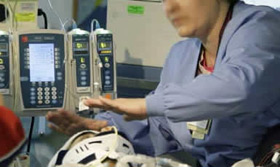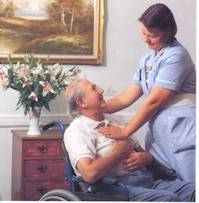I am a former nurse, and have had the privilege of working in hospitals in Ireland, Canada, Australia, and the USA.
 Complementary therapies and energy healing were popular in all of the countries I nursed in.
Complementary therapies and energy healing were popular in all of the countries I nursed in.
I personally witnessed holistic therapies being used on patients in the USA and Australia.
Reiki in Ireland has become very popular in recent years. I have taught many health care professionals at my Reiki courses in Dublin. Some hospitals, hospices, nursing homes and cancer support centres are now offering Reiki treatments.
Reiki energy is Gentle and Safe to use
The beauty of Reiki is that it is non invasive and is administered in a very gentle manner.
The Reiki practitioner can give Reiki without touching the body in cases where patients have burns or major injuries.
Reiki is a wonderful compliment to conventional medicine and helps relax patients on the levels of the mind and physical body. When a patient is relaxed the healing process is accelerated. Nurses comment that patients sleep much better and are calmer following Reiki treatments.
Reiki does not interfere with medical treatments or interventions. What can happen is that it helps improve your condition or medical challenge. In such cases, your medical team may review or reduce your medication.
Much has progressed since I started teaching Reiki in Ireland in 1996
There are some holistic healers and Reiki practitioners in Ireland who work as part of a team within the HSE. This team includes doctors, social workers and occupational therapists. In such situations the Reiki practitioners are also qualified nurses.
There are some volunteer programmes where holistic therapies can be used by non medical professionals. In such cases the volunteers usually go through in house training asides from the qualification they hold.
You can have Reiki if you have an ongoing medical challenge
Reiki is safe to use if you have medical conditions such as epilepsy, diabetes or heart conditions. You may receive Reiki treatments if you are undergoing chemotherapy or radium treatment.
Pregnant woman can have Reiki treatments, although they may prefer to have a Reiki chair treatment rather than lying down on a massage table.
The only time Reiki practitioners might refrain from giving Reiki treatments is if a patient is having a psychotic episode.
To find out more about Reiki in Ireland, Reiki courses or Reiki treatments visit www.thehealingpages.com
 A survey conducted in 2007 indicated that in the previous year 1.2 million adults and 161,000 children in the U.S. received one or more energy healing sessions such as Reiki.
A survey conducted in 2007 indicated that in the previous year 1.2 million adults and 161,000 children in the U.S. received one or more energy healing sessions such as Reiki.
